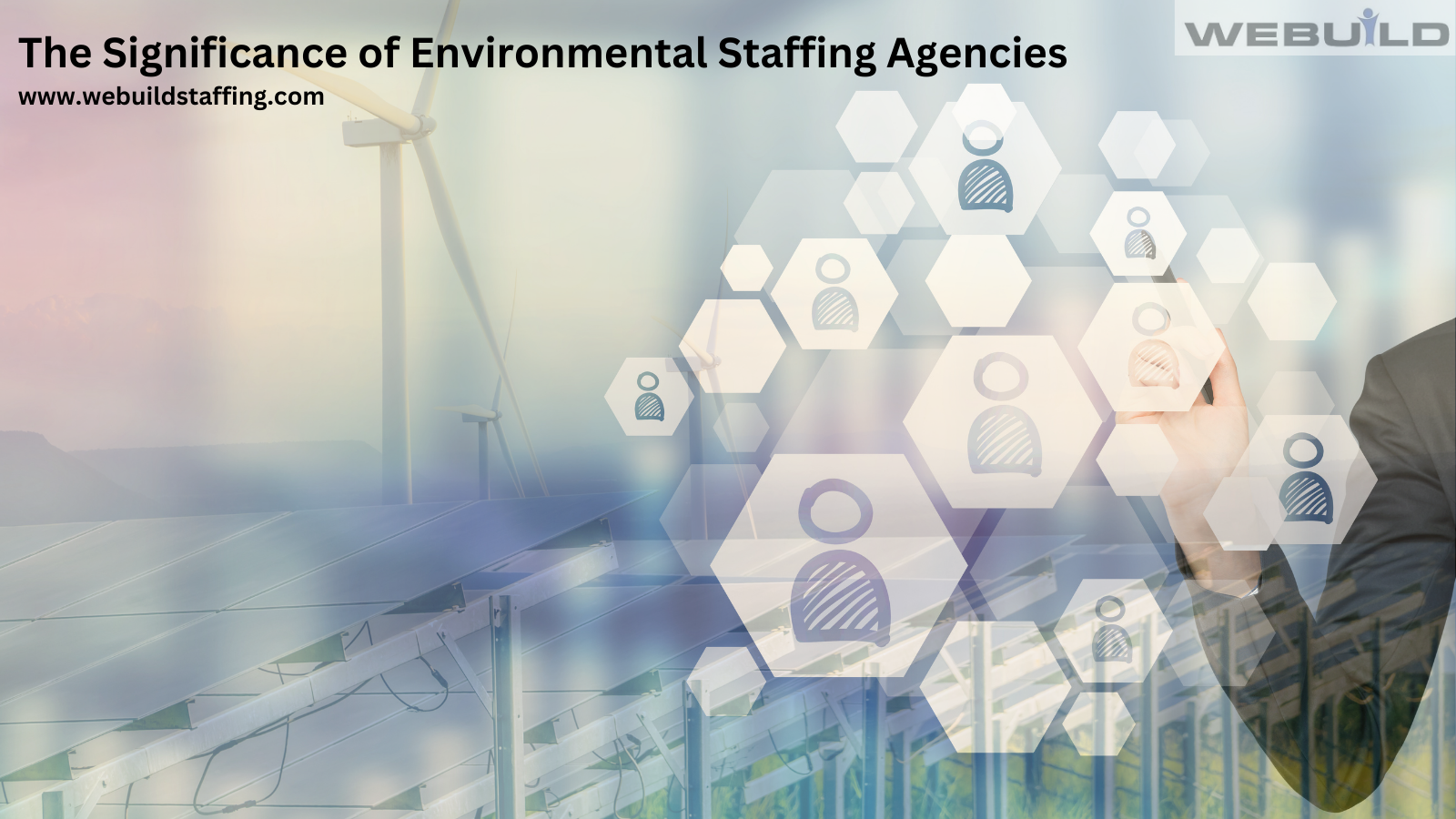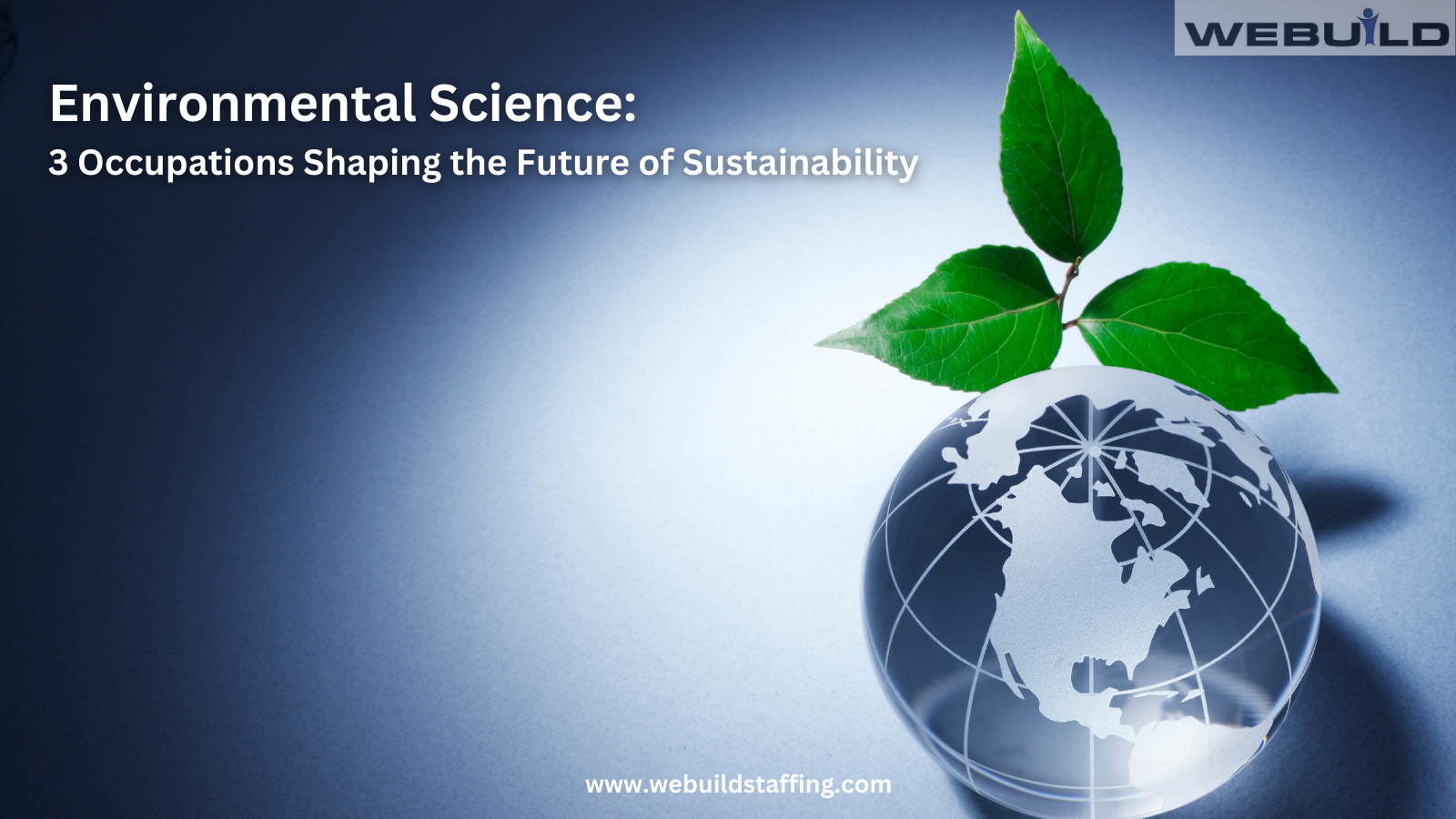Powering the Future: The Landscape of Renewable Energy Jobs – Opportunities and Challenges Ahead
WEBUILD STAFFING BLOG |
Powering the Future: The Landscape of Renewable Energy Jobs – Opportunities and Challenges Ahead

As the world shifts towards sustainable energy sources to combat climate change and reduce reliance on fossil fuels, the renewable energy sector is experiencing unprecedented growth. From solar and wind to hydro and geothermal, renewable energy sources offer immense potential for renewable energy jobs creation, economic growth, and environmental sustainability. Lets explore the future of renewable energy jobs, examining the opportunities and challenges that lie ahead in this dynamic and rapidly evolving industry.
The Global Transition to Renewable Energy: The transition to renewable energy is driven by a combination of factors, including environmental concerns, technological advancements, and economic incentives. Governments, businesses, and consumers are increasingly recognizing the benefits of renewable energy, such as reduced greenhouse gas emissions, energy security, and cost savings over time.
According to the International Renewable Energy Agency (IRENA), renewable energy employed approximately 11.5 million people worldwide in 2019, with significant growth expected in the coming years. The renewable energy sector offers a diverse range of job opportunities across various disciplines, including engineering, manufacturing, installation, operations, maintenance, and research and development.
Opportunities in the Renewable Energy Jobs Market:
-
Solar Photovoltaic (PV) Installers: Solar PV installers are responsible for assembling, installing, and maintaining solar panel systems on rooftops, ground-mounted arrays, and other structures. As solar energy becomes increasingly affordable and accessible, the demand for solar PV installers is expected to soar, creating numerous job opportunities in residential, commercial, and utility-scale solar projects.
-
Wind Turbine Technicians: Wind turbine technicians play a crucial role in the wind energy sector, performing installation, maintenance, and repair tasks on wind turbines and associated infrastructure. With the rapid expansion of wind power capacity worldwide, wind turbine technicians are in high demand, particularly in regions with favorable wind resources and ambitious renewable energy targets.
-
Renewable Energy Engineers: Renewable energy engineers design, develop, and optimize renewable energy systems, such as solar, wind, hydro, and geothermal power plants. They conduct feasibility studies, perform technical analyses, and oversee the implementation of renewable energy projects, ensuring their efficiency, reliability, and sustainability. Renewable energy engineers are instrumental in driving innovation and advancing renewable energy technologies.
-
Energy Storage Specialists: As intermittent renewable energy sources like solar and wind become more prevalent, the need for energy storage solutions is becoming increasingly critical. Energy storage specialists design and implement energy storage systems, such as batteries, pumped hydro storage, and thermal storage, to store surplus energy and ensure grid stability and reliability. Energy storage is expected to be a key growth area in the renewable energy sector, creating opportunities for skilled professionals in energy storage technologies and applications.
-
Renewable Energy Project Managers: Renewable energy project managers oversee the planning, execution, and monitoring of renewable energy projects from inception to completion. They coordinate with various stakeholders, manage resources, and ensure compliance with regulatory requirements and project timelines. Renewable energy project managers play a vital role in driving the successful implementation of renewable energy projects, from small-scale installations to large-scale utility projects.
Challenges Facing the Renewable Energy Jobs Market: While the renewable energy sector offers promising opportunities for job creation and economic development, it also faces several challenges that could impact its growth and sustainability.
-
Policy and Regulatory Uncertainty: Changes in government policies, incentives, and regulations can have a significant impact on the renewable energy market, affecting investment decisions, project development, and renewable energy jobs creation. Uncertainty surrounding renewable energy policies and regulatory frameworks can deter investors and developers, leading to project delays and market instability.
-
Market Competitiveness and Cost Pressures: While the cost of renewable energy technologies has declined significantly in recent years, renewable energy still faces competition from fossil fuels in many markets. Despite their environmental benefits, renewable energy sources must compete on cost and reliability to gain market share and attract investment. Cost pressures and market competitiveness can pose challenges for job creation and industry growth in the renewable energy sector.
-
Technological Innovation and Skills Development: The rapid pace of technological innovation in the renewable energy sector requires continuous skills development and training for the workforce. As renewable energy technologies evolve and become more sophisticated, there is a growing demand for skilled professionals with expertise in areas such as advanced manufacturing, digitalization, and data analytics. Ensuring a skilled and adaptable workforce is essential for driving innovation and maintaining competitiveness in the renewable energy job market.
-
Grid Integration and Infrastructure Challenges: Integrating renewable energy into existing electricity grids presents technical and logistical challenges, including grid stability, intermittency, and infrastructure constraints. As renewable energy penetration increases, grid modernization and investment in smart grid technologies are needed to accommodate variable renewable energy generation and ensure reliable and resilient power supply. Addressing grid integration challenges is critical for unlocking the full potential of renewable energy and maximizing job opportunities in the sector.
-
Global Market Dynamics and Geopolitical Factors: The renewable energy market is influenced by global market dynamics, geopolitical factors, and international trade policies, which can impact investment flows, market growth, and job creation. Shifts in energy demand, supply chains, and geopolitical tensions can create uncertainty and volatility in the renewable energy sector, affecting job prospects and industry competitiveness.
The future of renewable energy jobs is bright, with abundant opportunities for skilled professionals to contribute to the transition towards a sustainable energy future. From solar and wind to energy storage and grid modernization, the renewable energy sector offers diverse career paths and rewarding opportunities for those passionate about environmental sustainability, innovation, and economic development.
However, the renewable energy industry also faces challenges that require collaborative efforts from policymakers, industry stakeholders, and the workforce to overcome. By addressing policy and regulatory barriers, promoting technological innovation, investing in skills development, and enhancing grid infrastructure, we can unlock the full potential of renewable energy and create a thriving renewable energy jobs market that powers the future of sustainable energy.
Webuild Staffing Agency is a leading executive search and staffing agency dedicated to the construction, engineering and environmental industries. To learn more please visit: www.webuildstaffing.com










